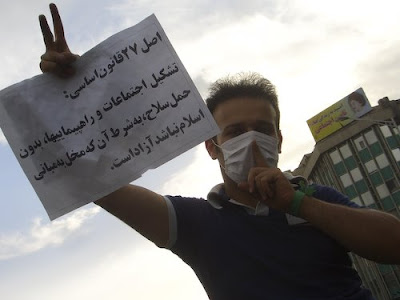Post by dgriffin on Jun 16, 2009 18:55:01 GMT -5
Christian Science Monitor News

Was Iran's election rigged?
Here's what is known so far.
The Guardian Council has agreed to a partial recount amid alleged irregularities, including an unusually swift announcement of results and a lack of variation in results between cities, rural areas, and ethnic strongholds.
Did the current regime think they could fool the people? No.
"They simply are not interested in these people continuing to be interested in politics in Iran. They want them to become demoralized and cynical, because their participation in the Iranian electoral process is extremely destructive for the [Islamic] system ..."
Istanbul, Turkey - In the biggest presidential election turnout in the history of the Islamic Republic, some 85 percent of Iran's electorate went to the polls last Friday and gave incumbent Mahmoud Ahmadinejad a landslide victory.
Or did they?
Defeated challenger Mir Hossein Mousavi claims that the official result of 62.6 percent for Mr. Ahmadinejad and just 33.7 percent for him was a "dangerous charade," and has called for a new election. His newspaper, Kalameh Sabz, reported that more than 10 million votes were missing personal identification numbers that made the votes untraceable. He also says some polling stations closed prematurely, preventing some voters from casting ballots.
Many others also suspect the legitimacy of the vote, for a number of reasons:
Results from 39.2 million handwritten ballots came much more swiftly than in previous votes, emerging within hours. Detailed election data typically released has not been made public.
Iran's Supreme Leader sanctioned Ahmadinejad's victory after a day, instead of the customary three.
Ahmadinejad made a surprisingly strong showing in wealthier cities, where he is known to have less support, and in the ethnic strongholds of his rivals. Results from cities and rural areas normally vary, but this time were remarkably consistent.
Farideh Farhi of the University of Hawaii, whose decades of studying Iran has included poring over data from Iranian elections, says the result was "pulled out of a hat." Here's why.
CONTINUED:
www.csmonitor.com/2009/0617/p06s01-wome.html

Was Iran's election rigged?
Here's what is known so far.
The Guardian Council has agreed to a partial recount amid alleged irregularities, including an unusually swift announcement of results and a lack of variation in results between cities, rural areas, and ethnic strongholds.
Did the current regime think they could fool the people? No.
"They simply are not interested in these people continuing to be interested in politics in Iran. They want them to become demoralized and cynical, because their participation in the Iranian electoral process is extremely destructive for the [Islamic] system ..."
Istanbul, Turkey - In the biggest presidential election turnout in the history of the Islamic Republic, some 85 percent of Iran's electorate went to the polls last Friday and gave incumbent Mahmoud Ahmadinejad a landslide victory.
Or did they?
Defeated challenger Mir Hossein Mousavi claims that the official result of 62.6 percent for Mr. Ahmadinejad and just 33.7 percent for him was a "dangerous charade," and has called for a new election. His newspaper, Kalameh Sabz, reported that more than 10 million votes were missing personal identification numbers that made the votes untraceable. He also says some polling stations closed prematurely, preventing some voters from casting ballots.
Many others also suspect the legitimacy of the vote, for a number of reasons:
Results from 39.2 million handwritten ballots came much more swiftly than in previous votes, emerging within hours. Detailed election data typically released has not been made public.
Iran's Supreme Leader sanctioned Ahmadinejad's victory after a day, instead of the customary three.
Ahmadinejad made a surprisingly strong showing in wealthier cities, where he is known to have less support, and in the ethnic strongholds of his rivals. Results from cities and rural areas normally vary, but this time were remarkably consistent.
Farideh Farhi of the University of Hawaii, whose decades of studying Iran has included poring over data from Iranian elections, says the result was "pulled out of a hat." Here's why.
CONTINUED:
www.csmonitor.com/2009/0617/p06s01-wome.html



